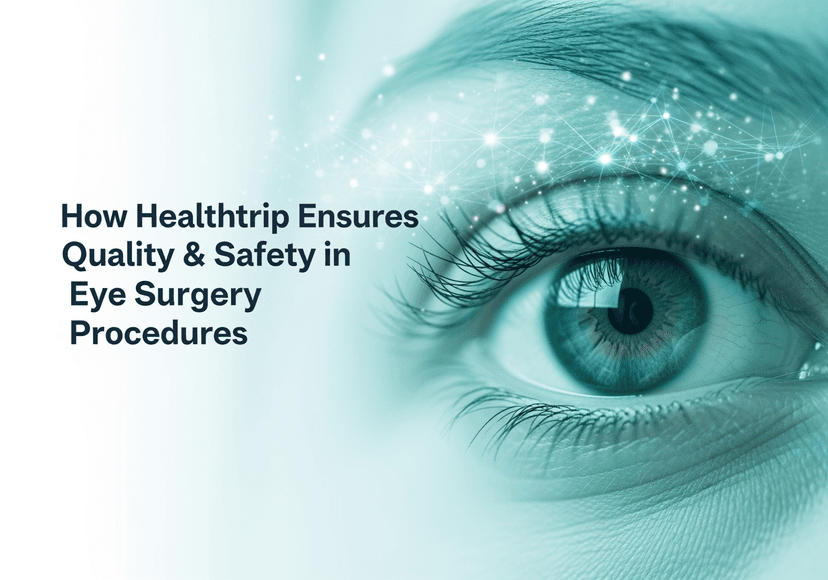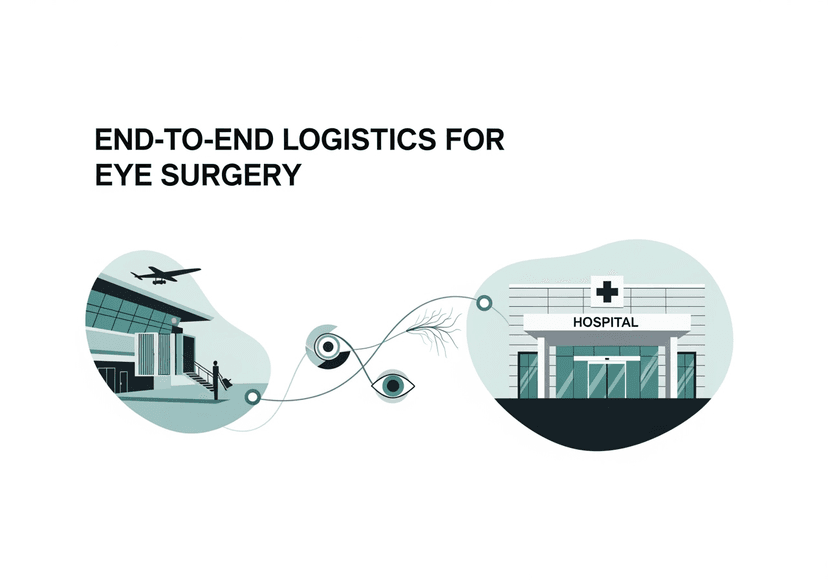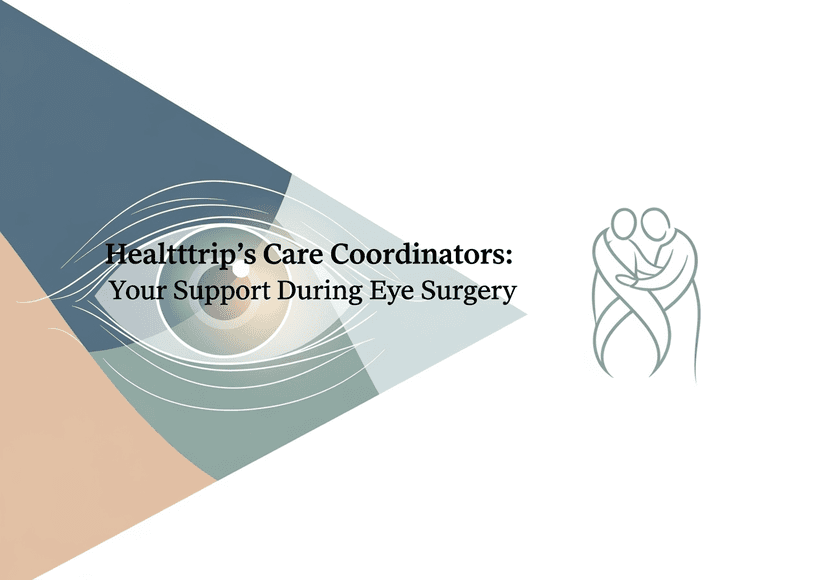
Common Risks in Eye Surgery and How Healthtrip Manages Them
16 Oct, 2025
 Healthtrip
Healthtrip- Understanding Common Risks Associated with Eye Surgery
- Infection Prevention and Management Strategies at Healthtrip
- Managing Dry Eye Syndrome Post-Surgery : A Healthtrip Approach
- Controlling Inflammation and Swelling After Eye Surgery
- Addressing Vision Disturbances: Double Vision, Halos & Glare
- Retinal Detachment: Risks and Healthtrip's Preventative Measures with experts from Mount Elizabeth Hospital, Singapore and Singapore General Hospital
- Healthtrip Hospital Network for Eye Surgery Risk Management: Examples from Memorial Bahçelievler Hospital, LIV Hospital, Istanbul and Yanhee International Hospital.
- Conclusion: Minimizing Risks and Ensuring Safe Eye Surgery with Healthtrip
Common Risks in Eye Surgery
Infection
Infection is a potential risk with any surgical procedure, including eye surgery. While modern surgical techniques and sterile environments minimize this risk, it's essential to understand how it can occur. Infections can develop if bacteria enter the eye during or after the surgery. Symptoms may include redness, pain, swelling, and discharge. To prevent infection, surgeons follow strict sterilization protocols, use antibiotics before and after the surgery, and provide patients with detailed instructions on post-operative care. At Healthtrip, we partner with hospitals like Memorial Sisli Hospital that adhere to the highest standards of hygiene and patient safety. We also ensure that you receive clear and comprehensive aftercare instructions to minimize the risk of infection and promote a speedy recovery. Our care team is always available to address any concerns or questions you may have, providing you with the support you need to feel confident and secure throughout your recovery.
Most popular procedures in India
Bleeding
Bleeding, or hemorrhage, is another potential risk associated with eye surgery. While significant bleeding is rare, minor bleeding can occur during or after the procedure. This can result in blurry vision, discomfort, or bruising around the eye. Surgeons take meticulous precautions to minimize bleeding, including using precise surgical techniques and managing any pre-existing conditions that may increase bleeding risk. For instance, patients undergoing procedures at Fortis Hospital, Noida, benefit from advanced surgical equipment and skilled medical teams trained to manage such situations effectively. Healthtrip ensures that you receive a thorough pre-operative assessment to identify any potential bleeding risks. We coordinate with your medical team to develop a personalized plan to mitigate these risks. Our commitment is to provide you with a seamless and safe surgical experience, supported by the best medical practices and attentive care.
Inflammation
Inflammation is a natural response to any surgical procedure, including eye surgery. It's the body's way of initiating the healing process. However, excessive or prolonged inflammation can lead to discomfort and potentially affect the outcome of the surgery. Symptoms of inflammation include redness, swelling, pain, and sensitivity to light. To manage inflammation, doctors typically prescribe anti-inflammatory medications, such as eye drops or oral medications. Following post-operative care instructions carefully is crucial for minimizing inflammation. At Healthtrip, we provide you with comprehensive guidance on managing inflammation, including detailed instructions on medication usage and self-care techniques. We work with hospitals like Yanhee International Hospital, which are known for their excellent post-operative care and patient support. Our dedicated care team is available to answer your questions and address any concerns you may have, ensuring your recovery is as smooth and comfortable as possible.
Wellness Treatments
Give yourself the time to relax
Lowest Prices Guaranteed!

Lowest Prices Guaranteed!
Dry Eye
Dry eye is a common side effect following various types of eye surgery. It occurs because the surgery can temporarily disrupt the tear film, which is essential for keeping the eye lubricated and comfortable. Symptoms of dry eye include a gritty sensation, burning, blurry vision, and excessive tearing. While dry eye is usually temporary, it can be bothersome and affect your vision. Treatment typically involves using artificial tears to lubricate the eyes and, in some cases, prescription eye drops to stimulate tear production. Staying hydrated and avoiding dry environments can also help alleviate symptoms. Healthtrip understands the discomfort of dry eye and ensures you receive expert advice from our network of ophthalmologists. Whether you choose to undergo surgery at BNH Hospital or another trusted facility, we ensure that your post-operative care includes strategies to manage and minimize dry eye symptoms. Our goal is to support your comfort and ensure optimal vision throughout your recovery.
Double Vision
Double vision, or diplopia, is a condition where you see two images of a single object. It can occur after eye surgery due to changes in the eye muscles or the way the brain processes visual information. Double vision can be temporary or, in rare cases, persistent. Treatment options may include eye exercises, prism glasses, or, in some cases, additional surgery to realign the eye muscles. If you experience double vision after eye surgery, it's essential to consult with your doctor for a proper diagnosis and treatment plan. At Healthtrip, we understand that double vision can be disconcerting. We connect you with experienced ophthalmologists at facilities such as Saudi German Hospital Cairo, Egypt, who can provide thorough evaluations and personalized treatment plans. Our commitment is to ensure you receive the best possible care to address your specific needs and restore your vision. With Healthtrip, you can navigate your recovery with confidence, knowing that expert support is always within reach.
How Healthtrip Manages These Risks
Pre-operative Assessment
A thorough pre-operative assessment is the cornerstone of minimizing risks in eye surgery. At Healthtrip, we ensure that every patient undergoes a comprehensive evaluation before any procedure. This assessment includes a detailed medical history, a complete eye examination, and any necessary diagnostic tests. The purpose is to identify any pre-existing conditions or risk factors that may affect the outcome of the surgery. For example, conditions like diabetes, high blood pressure, or bleeding disorders can increase the risk of complications during and after surgery. Our network of experienced ophthalmologists, many associated with hospitals like Helios Klinikum Erfurt, uses the information gathered during the assessment to develop a personalized surgical plan tailored to your specific needs. This proactive approach allows us to anticipate potential challenges and take steps to mitigate them, ensuring the safest and most effective surgical experience possible. Healthtrip is committed to providing you with the most personalized and informed care possible, starting from your initial assessment.
Careful Surgeon and Facility Selection
Choosing the right surgeon and facility is paramount for a successful eye surgery outcome. Healthtrip partners with a network of highly qualified and experienced ophthalmologists and leading medical facilities known for their excellence in eye care. We carefully vet each surgeon's credentials, experience, and track record to ensure they meet our stringent standards. Similarly, we evaluate the facilities, such as Quironsalud Hospital Murcia, to ensure they have state-of-the-art equipment, adhere to strict safety protocols, and provide exceptional patient care. We consider factors such as the surgeon's specialization, the facility's infection control measures, and the availability of advanced technologies. Our goal is to match you with a surgeon and facility that best suits your individual needs and preferences. Healthtrip's rigorous selection process gives you peace of mind, knowing that you are in the hands of trusted professionals committed to delivering the highest quality care. We prioritize your safety and well-being above all else, ensuring a smooth and successful surgical journey.
Detailed Pre- and Post-operative Instructions
Clear and comprehensive instructions are vital for a smooth surgical journey. Healthtrip provides detailed pre-operative guidelines to prepare you for your procedure, including information about medication, dietary restrictions, and what to expect on the day of surgery. We also offer comprehensive post-operative instructions to guide your recovery, covering topics such as medication administration, wound care, and activity restrictions. These instructions are tailored to your specific surgery and individual needs, minimizing the potential for confusion and errors. In addition, we provide access to educational resources and support materials to help you understand your condition and treatment options. Whether you're receiving care at NMC Specialty Hospital, Abu Dhabi, or any other of our partner facilities, you can rest assured that you'll have the knowledge and support you need to navigate your recovery with confidence. Healthtrip's commitment to clear communication and comprehensive instructions ensures that you are well-informed and empowered every step of the way.
Close Monitoring and Follow-up
Close monitoring and follow-up care are essential for identifying and addressing any potential complications after eye surgery. Healthtrip ensures that you receive regular follow-up appointments with your surgeon to monitor your progress and assess your healing. These appointments allow the surgeon to detect any early signs of infection, inflammation, or other issues and intervene promptly. We also provide access to a 24/7 support line where you can reach out to our medical team with any questions or concerns. For patients who travel for surgery, Healthtrip coordinates with local healthcare providers to ensure seamless continuity of care upon their return home. Whether you've had your procedure at LIV Hospital, Istanbul, or another international facility, we ensure that you receive the ongoing support you need to achieve the best possible outcome. Healthtrip is committed to providing comprehensive and continuous care, ensuring your safety and well-being throughout your entire surgical journey.
Prompt Intervention
In the rare event that complications arise after eye surgery, prompt intervention is crucial. Healthtrip has established protocols to ensure timely and effective management of any issues. Our medical team works closely with your surgeon to assess the situation and develop an appropriate treatment plan. This may involve medication adjustments, additional procedures, or referral to a specialist. We prioritize your safety and well-being above all else, ensuring that you receive the immediate care you need to resolve any complications. Healthtrip's network of experienced medical professionals, including those at Mount Elizabeth Hospital, are equipped to handle a wide range of surgical complications. Our coordinated approach ensures that you receive seamless and efficient care, minimizing any potential long-term effects. Healthtrip's commitment to prompt intervention provides you with peace of mind, knowing that you are in the hands of a responsive and caring medical team.
Understanding Common Risks Associated with Eye Surgery
Undergoing eye surgery can be a life-changing decision, offering the promise of improved vision and a better quality of life. However, like any surgical procedure, it's crucial to be aware of the potential risks involved. At Healthtrip, we believe in empowering our patients with comprehensive information so they can make informed choices about their healthcare journey. We understand that the thought of potential complications can be daunting, but with proper understanding and meticulous planning, these risks can be significantly minimized. This blog post aims to shed light on some of the common risks associated with eye surgery, offering insights into how Healthtrip and our network of world-class hospitals are dedicated to ensuring your safety and well-being throughout the entire process. Think of us as your trusted guide, navigating the complexities of eye surgery with you, every step of the way. We will discuss typical issues reported from infections to dry eye syndrome, and even retinal detachment so you can have a clear idea of what to expect. After all, being well-informed is the first step towards a successful and worry-free surgical experience. Let's explore these potential risks together, with a focus on proactive prevention and effective management strategies.
Risk of Infection
Infection, while a relatively rare occurrence, remains a potential risk following any surgical procedure, including eye surgery. This can happen when bacteria or other microorganisms enter the eye during or after the operation. Symptoms of an eye infection can include redness, pain, blurred vision, discharge, and increased sensitivity to light. It's important to note that the risk of infection varies depending on the type of surgery performed and the individual's overall health. At Healthtrip, we prioritize strict adherence to sterile protocols and hygiene standards in all our partner hospitals, such as Saudi German Hospital Alexandria, Egypt and Breyer, Kaymak & Klabe Augenchirurgie, to minimize the risk of infection. Our partner surgeons use advanced techniques and meticulously sterilize all surgical instruments and equipment. Furthermore, patients receive detailed instructions on post-operative care, including proper hand hygiene and the use of prescribed antibiotic eye drops to prevent infection. We believe that a proactive approach, combined with rigorous safety measures, is essential in ensuring a safe and successful outcome for our patients. In the rare event that an infection does occur, our medical teams are equipped to provide prompt and effective treatment to prevent further complications and protect your vision. We are with you, every step of the way, ensuring your peace of mind.
Dry Eye Syndrome
Dry eye syndrome is a common condition that can develop or worsen after certain types of eye surgery, particularly refractive procedures like LASIK. It occurs when the eyes don't produce enough tears or the tears are of poor quality, leading to discomfort, blurry vision, and a gritty sensation. While usually temporary, dry eye can sometimes persist for several months after surgery. The good news is that it's often manageable with proper care and treatment. At Healthtrip, we take dry eye seriously and implement proactive strategies to minimize its impact on our patients. Our comprehensive pre-operative assessments help identify individuals who may be at higher risk for developing dry eye. We also utilize advanced surgical techniques that are designed to minimize disruption to the corneal nerves, which play a crucial role in tear production. Post-operatively, we provide personalized treatment plans that may include artificial tears, lubricating ointments, punctal plugs (small devices that block tear drainage), and other therapies to alleviate symptoms and promote tear production. Our team will closely monitor your progress and adjust your treatment plan as needed to ensure your comfort and optimal vision. Remember, at Healthtrip, your well-being is our top priority, and we are committed to providing you with the best possible care to manage and overcome any post-operative challenges.
Inflammation and Swelling
Inflammation and swelling are natural responses to any surgical procedure, including eye surgery. They occur as the body's immune system works to heal the affected tissues. While these are normal occurrences, excessive inflammation and swelling can cause discomfort, blurry vision, and, in rare cases, potentially interfere with the healing process. At Healthtrip, we take a proactive approach to manage inflammation and swelling after eye surgery to ensure the best possible outcome for our patients. Our surgeons employ minimally invasive techniques whenever possible to reduce tissue trauma and minimize the inflammatory response. We also prescribe anti-inflammatory medications, such as steroid eye drops, to help control inflammation and promote healing. In addition, we provide patients with detailed instructions on how to care for their eyes after surgery, including the use of cold compresses to reduce swelling and discomfort. Regular follow-up appointments allow our medical team to monitor your progress and adjust your treatment plan as needed. We understand that dealing with inflammation and swelling can be frustrating, but with our comprehensive approach and personalized care, we are confident that we can help you manage these symptoms effectively and achieve optimal healing. Healthtrip is always by your side, providing the support and guidance you need throughout your recovery journey. Hospitals like Fortis Shalimar Bagh follow very strict and precise protocol when it comes to minimising such things.
Infection Prevention and Management Strategies at Healthtrip
Preventing and managing infections after eye surgery is a top priority at Healthtrip. We understand that even with the best surgical techniques and sterile environments, the risk of infection cannot be completely eliminated. That's why we have implemented a comprehensive range of infection prevention and management strategies to safeguard our patients' well-being. Our approach begins with a thorough pre-operative assessment to identify any potential risk factors for infection, such as pre-existing conditions or medications that may compromise the immune system. We work closely with our partner hospitals, including Yanhee International Hospital and Memorial Bahçelievler Hospital, to ensure strict adherence to the highest standards of hygiene and sterilization. This includes the use of advanced sterilization equipment, rigorous hand hygiene protocols, and the use of single-use surgical instruments whenever possible. During surgery, our surgeons employ meticulous techniques to minimize tissue trauma and reduce the risk of bacterial contamination. Post-operatively, patients receive detailed instructions on proper wound care, including the use of prescribed antibiotic eye drops to prevent infection. We also emphasize the importance of avoiding touching the eyes and maintaining good hand hygiene. In the rare event that an infection does occur, our medical teams are equipped to provide prompt and effective treatment, including the use of antibiotics, antiviral medications, and other therapies. We closely monitor our patients' progress and adjust the treatment plan as needed to ensure a successful outcome. At Healthtrip, we are committed to providing our patients with the safest possible surgical experience, and our comprehensive infection prevention and management strategies are a testament to that commitment. Think of Healthtrip as your reliable shield, always protecting your health and peace of mind.
Rigorous Hygiene Protocols
At Healthtrip, we recognize that stringent hygiene protocols are the cornerstone of infection prevention in eye surgery. We collaborate with our partner hospitals, such as Vejthani Hospital and Saudi German Hospital Cairo, Egypt, to ensure the implementation and consistent adherence to the highest standards of cleanliness and sterilization. This encompasses every aspect of the surgical environment, from the operating room to the recovery area. Our protocols include meticulous cleaning and disinfection of all surfaces and equipment, the use of sterile drapes and gowns, and rigorous hand hygiene practices for all medical personnel. We also employ advanced air filtration systems to minimize the presence of airborne contaminants in the operating room. Furthermore, we conduct regular audits and inspections to ensure that our hygiene protocols are being followed meticulously. We believe that a culture of cleanliness and vigilance is essential in preventing infections and safeguarding the health of our patients. Our commitment to rigorous hygiene protocols reflects our unwavering dedication to providing you with the safest possible surgical experience. We see it as our duty to create an environment where the risk of infection is minimized, allowing you to focus on your recovery and the joy of improved vision. It’s all about creating the safest experience for you.
Advanced Sterilization Techniques
Beyond rigorous hygiene protocols, Healthtrip is committed to utilizing advanced sterilization techniques to further minimize the risk of infection during eye surgery. We understand that traditional sterilization methods may not always be sufficient to eliminate all microorganisms, which is why we invest in state-of-the-art sterilization equipment and employ cutting-edge techniques. Our partner hospitals, including NMC Specialty Hospital, Al Nahda, Dubai and Taoufik Clinic, Tunisia, utilize autoclaves, which use high-pressure steam to kill bacteria, viruses, and fungi on surgical instruments and equipment. We also employ chemical sterilization methods, such as the use of ethylene oxide gas, to sterilize items that cannot withstand high temperatures. Furthermore, we utilize single-use surgical instruments whenever possible to eliminate the risk of cross-contamination. All sterilization processes are carefully monitored and validated to ensure their effectiveness. We adhere to strict quality control standards and regularly test our sterilization equipment to ensure that it is functioning properly. Our commitment to advanced sterilization techniques reflects our unwavering dedication to providing our patients with the safest possible surgical experience. At Healthtrip, we believe that investing in the latest technology and adhering to the highest standards of sterilization is essential in preventing infections and ensuring optimal outcomes for our patients. It allows you to breathe easily knowing that every precaution has been taken.
Managing Dry Eye Syndrome Post-Surgery : A Healthtrip Approach
As we've discussed, dry eye syndrome is a common post-operative concern that can significantly impact patients' comfort and vision after eye surgery. At Healthtrip, we don't just acknowledge this risk – we proactively manage it with a comprehensive and patient-centered approach. We understand that dry eye can be frustrating and uncomfortable, but we want you to know that we are here to help you navigate this challenge and achieve optimal visual outcomes. Our approach begins with a thorough pre-operative assessment to identify individuals who may be at higher risk for developing dry eye. This includes evaluating your tear production, tear quality, and the health of your ocular surface. Based on this assessment, we tailor a personalized treatment plan to minimize your risk of developing dry eye after surgery. We utilize advanced surgical techniques that are designed to minimize disruption to the corneal nerves, which play a crucial role in tear production. Post-operatively, we provide patients with a range of treatment options to alleviate symptoms and promote tear production, including artificial tears, lubricating ointments, punctal plugs, and other therapies. We also emphasize the importance of lifestyle modifications, such as avoiding dry environments, using a humidifier, and taking breaks from screen time. Our team closely monitors your progress and adjusts your treatment plan as needed to ensure your comfort and optimal vision. At Healthtrip, we are committed to providing you with the best possible care to manage and overcome any post-operative challenges, including dry eye syndrome. We want you to feel confident and supported throughout your entire journey with us. Hospitals like LIV Hospital, Istanbul are well equipped to deal with such post-surgery challenges.
Personalized Treatment Plans
At Healthtrip, we recognize that every patient is unique, and that a one-size-fits-all approach to managing dry eye syndrome simply isn't effective. That's why we develop personalized treatment plans that are tailored to your specific needs and circumstances. Our approach begins with a comprehensive evaluation of your individual risk factors, symptoms, and medical history. We take the time to listen to your concerns and understand your goals for treatment. Based on this information, we create a customized treatment plan that may include a combination of therapies, such as artificial tears, lubricating ointments, punctal plugs, prescription eye drops, and lifestyle modifications. We also consider your preferences and lifestyle when developing your treatment plan. We understand that some patients may prefer natural remedies, while others may be more comfortable with prescription medications. We work closely with you to find a treatment approach that is both effective and sustainable. Our team closely monitors your progress and adjusts your treatment plan as needed. We understand that dry eye symptoms can fluctuate over time, so we are always available to provide support and guidance. Our commitment to personalized treatment plans reflects our unwavering dedication to providing you with the best possible care. Healthtrip takes a special interest in you. The entire experience revolves around you.
Advanced Therapies and Technologies
Healthtrip is committed to utilizing advanced therapies and technologies to effectively manage dry eye syndrome and provide our patients with the best possible outcomes. We stay at the forefront of advancements in dry eye treatment and invest in state-of-the-art equipment and techniques. Our partner hospitals, like Thumbay Hospital and BNH Hospital, offer a range of advanced therapies, including intense pulsed light (IPL) therapy, which can help to reduce inflammation and improve tear production. We also offer thermal pulsation therapy, which uses heat and massage to unclog the meibomian glands, which are responsible for producing the oily layer of tears that prevents evaporation. In addition, Healthtrip also provides scleral lenses which are custom-fitted contact lenses that create a reservoir of fluid over the cornea, providing relief from dry eye symptoms. Our team of experienced ophthalmologists and optometrists is trained in the latest techniques for diagnosing and treating dry eye syndrome. We use advanced diagnostic tools to assess the severity of your dry eye and determine the underlying cause. Based on this information, we recommend the most appropriate treatment options for your individual needs. Our commitment to advanced therapies and technologies reflects our unwavering dedication to providing our patients with the best possible care. We believe that by staying at the forefront of advancements in dry eye treatment, we can help you achieve long-lasting relief from your symptoms and improve your quality of life.
Also Read:
Controlling Inflammation and Swelling After Eye Surgery
Post-operative inflammation and swelling are common occurrences after eye surgery, often causing discomfort and blurred vision. At Healthtrip, we understand that managing these symptoms is crucial for a smooth recovery and optimal visual outcomes. Inflammation is the body's natural response to surgery, as it initiates the healing process. However, excessive inflammation can hinder recovery and potentially lead to complications. Similarly, swelling around the eye can cause pressure and discomfort, affecting vision clarity. The extent of inflammation and swelling varies depending on the type of surgery, individual healing capabilities, and adherence to post-operative instructions. Therefore, a proactive and comprehensive approach is essential to minimize these effects and promote effective healing. Furthermore, emotional well-being also plays a crucial role in recovery. Stress and anxiety can sometimes exacerbate inflammation, so maintaining a calm and positive outlook is beneficial. At Healthtrip, our comprehensive care extends beyond medical treatments to include emotional support and guidance throughout your recovery journey.
Immediate Post-Operative Measures
Immediately following eye surgery, implementing specific measures can significantly reduce inflammation and swelling. Applying cold compresses to the affected eye for 15-20 minutes at a time, several times a day, can help constrict blood vessels and minimize swelling. It's important to protect the eye from direct pressure and ensure the compress is clean to avoid infection. Over-the-counter pain relievers, as recommended by your surgeon, can also help manage discomfort and reduce inflammation. At Healthtrip, our partner hospitals, such as Yanhee International Hospital and Vejthani Hospital provide patients with detailed post-operative care kits that include instructions on cold compress application and appropriate pain medication. Keeping the head elevated, especially while sleeping, can also help reduce swelling by promoting fluid drainage. Avoiding strenuous activities and heavy lifting is crucial to prevent increased blood flow to the head and minimize the risk of further swelling. Our team ensures that each patient receives personalized instructions tailored to their specific surgery and health condition, promoting a comfortable and complication-free recovery. Remember, consistent adherence to these instructions is key to achieving the best possible results.
Medications and Eye Drops
Prescription medications and eye drops play a vital role in controlling inflammation and preventing infection after eye surgery. Corticosteroid eye drops are commonly prescribed to reduce inflammation, while antibiotic drops help prevent bacterial infections. It is essential to follow the prescribed dosage and frequency of application, as improper use can lead to complications. Healthtrip emphasizes the importance of clear communication between patients and surgeons regarding medication instructions. Our affiliated hospitals, including Memorial Bahçelievler Hospital and LIV Hospital, Istanbul, provide detailed medication schedules and instructions to ensure patients understand how to administer their eye drops correctly. Anti-inflammatory medications taken orally may also be prescribed in some cases to manage more severe inflammation. Regular follow-up appointments are crucial to monitor the effectiveness of the medications and adjust the treatment plan as needed. At Healthtrip, we facilitate these appointments, ensuring seamless communication between patients and their medical teams. If you experience any adverse reactions or have concerns about your medications, it's essential to contact your healthcare provider immediately for guidance.
Also Read:
Addressing Vision Disturbances: Double Vision, Halos & Glare
Experiencing vision disturbances such as double vision, halos, and glare after eye surgery can be unsettling, but it's important to understand that these are often temporary side effects. At Healthtrip, we recognize the anxiety these disturbances can cause and provide comprehensive support to help patients navigate this phase of recovery. Double vision, or diplopia, occurs when the eyes are not properly aligned, causing you to see two images of a single object. Halos are bright circles that appear around light sources, while glare refers to the scattering of light that can make it difficult to see clearly, especially at night or in bright conditions. These disturbances can arise due to corneal swelling, changes in the lens, or adjustments the brain is making as it adapts to the post-surgical changes in vision. The duration and severity of these symptoms can vary depending on the type of surgery performed and individual healing processes. Understanding the underlying causes and available management strategies can help patients feel more confident and in control of their recovery. Healthtrip is committed to providing clear, accessible information and expert guidance to help you regain optimal vision.
Causes and Expected Duration
The causes of vision disturbances following eye surgery can be multi-faceted. Corneal swelling is a common culprit, particularly after procedures like LASIK or corneal transplants. This swelling can distort the way light enters the eye, leading to halos and glare. Changes in the lens, such as those that occur after cataract surgery, can also cause temporary vision disturbances as the eye adjusts to the new lens implant. In some cases, inflammation can contribute to double vision by affecting the muscles that control eye movement. The expected duration of these disturbances varies depending on the underlying cause and the individual's healing rate. In many cases, these symptoms resolve within a few weeks to a few months as the eye heals and stabilizes. However, some individuals may experience longer-lasting symptoms that require further intervention. Healthtrip's network of experienced ophthalmologists, including those at Saudi German Hospital Alexandria, Egypt and Breyer, Kaymak & Klabe Augenchirurgie, are skilled at diagnosing the specific cause of vision disturbances and recommending appropriate treatment strategies. Regular follow-up appointments are essential to monitor progress and ensure that any lingering symptoms are addressed promptly.
Management and Corrective Measures
Managing vision disturbances after eye surgery involves a range of strategies tailored to the specific symptoms and underlying cause. For corneal swelling, lubricating eye drops can help soothe the eye and improve vision clarity. In some cases, your doctor may prescribe stronger anti-inflammatory drops to reduce swelling more effectively. For double vision, temporary solutions like wearing an eye patch or using prism glasses can help align the images and alleviate the symptom. Vision therapy exercises can also strengthen the eye muscles and improve coordination over time. For halos and glare, special glasses with anti-reflective coatings can reduce light scattering and improve vision in bright conditions or at night. In rare cases, additional surgical procedures may be necessary to correct persistent vision disturbances. Healthtrip works with leading eye care specialists at hospitals like Fortis Escorts Heart Institute and Fortis Shalimar Bagh, who are experts in managing complex post-operative complications. We ensure that patients have access to the latest diagnostic tools and treatment options, providing peace of mind and optimal visual outcomes. Lifestyle adjustments, such as avoiding driving at night if glare is severe, can also help manage symptoms while the eye heals.
When to Seek Further Medical Attention
While many vision disturbances are temporary and resolve on their own, it's important to know when to seek further medical attention. If you experience a sudden worsening of symptoms, such as a sharp decrease in vision, severe eye pain, or persistent double vision that doesn't improve with conservative measures, it's essential to contact your doctor immediately. These symptoms could indicate a more serious complication, such as infection, retinal detachment, or increased eye pressure. Healthtrip provides 24/7 support to patients, ensuring they can access medical advice and guidance whenever they need it. Our team can help you determine whether your symptoms warrant an urgent visit to the doctor and facilitate prompt access to care. Regular follow-up appointments are crucial to monitor your progress and address any concerns you may have. Open communication with your medical team is key to ensuring a successful recovery. Trust your instincts and don't hesitate to seek help if something doesn't feel right. Remember, Healthtrip is here to support you every step of the way.
Also Read:
Retinal Detachment: Risks and Healthtrip's Preventative Measures with experts from Mount Elizabeth Hospital, Singapore and Singapore General Hospital
Retinal detachment, though a rare complication of eye surgery, is a serious condition that requires prompt diagnosis and treatment to prevent permanent vision loss. At Healthtrip, we prioritize patient safety and implement stringent preventative measures to minimize the risk of retinal detachment following eye surgery. The retina is a thin layer of tissue at the back of the eye that is responsible for capturing light and transmitting visual information to the brain. A retinal detachment occurs when the retina separates from the underlying tissue, disrupting its blood supply and causing a loss of vision. While retinal detachment can occur spontaneously, it is more common in individuals who have undergone certain types of eye surgery, such as cataract surgery or vitrectomy. Factors that increase the risk of retinal detachment include high myopia (nearsightedness), a family history of retinal detachment, and previous eye trauma. Recognizing the signs and symptoms of retinal detachment is crucial for early detection and treatment. Symptoms may include a sudden onset of floaters (small specks or lines that appear to drift across your vision), flashes of light, a shadow or curtain-like obstruction in your peripheral vision, and blurred vision. Healthtrip collaborates with leading experts from Mount Elizabeth Hospital and Singapore General Hospital to provide comprehensive care and preventative strategies.
Risk Factors and Early Detection
Identifying risk factors for retinal detachment is essential for implementing targeted preventative measures. Individuals with high myopia are at increased risk due to the stretching and thinning of the retina associated with this condition. Patients who have undergone previous eye surgery, particularly those involving the vitreous gel (the clear gel that fills the eye), are also at higher risk. A family history of retinal detachment indicates a genetic predisposition to the condition. Other risk factors include age-related changes in the vitreous gel, eye trauma, and certain systemic diseases like diabetes. Early detection of retinal detachment is crucial for preserving vision. Healthtrip emphasizes the importance of regular eye exams, especially for individuals with risk factors. Our partner hospitals, including Quironsalud Hospital Toledo and Yanhee International Hospital, offer comprehensive eye exams that include dilated retinal examinations to detect early signs of retinal detachment. Patients are educated about the symptoms of retinal detachment and advised to seek immediate medical attention if they experience any of these symptoms. Healthtrip's team of experienced ophthalmologists is trained to recognize subtle signs of retinal detachment and provide prompt and effective treatment. Our proactive approach to risk assessment and early detection helps minimize the impact of this potentially sight-threatening condition.
Healthtrip's Preventative Strategies
Healthtrip employs a multi-faceted approach to prevent retinal detachment following eye surgery. Pre-operative assessments are thorough and identify patients at higher risk. Surgical techniques are refined and minimally invasive to reduce trauma to the eye and minimize the risk of complications. During surgery, surgeons take meticulous care to avoid excessive traction on the retina and ensure proper closure of any incisions. Post-operative care includes detailed instructions on activities to avoid and warning signs to watch out for. Patients are advised to avoid strenuous activities, heavy lifting, and sudden head movements that could increase the risk of retinal detachment. Healthtrip also emphasizes the importance of regular follow-up appointments to monitor the healing process and detect any early signs of complications. Our affiliated hospitals, such as Memorial Bahçelievler Hospital and LIV Hospital, Istanbul, are equipped with state-of-the-art diagnostic equipment to detect subtle changes in the retina. In cases where retinal detachment is suspected, Healthtrip facilitates prompt referral to experienced retinal specialists for evaluation and treatment. Our commitment to preventative strategies and early intervention helps ensure the best possible outcomes for our patients. Furthermore, Healthtrip also provides patients with access to educational resources and support groups to help them better understand the risks and management of retinal detachment.
Also Read:
Healthtrip Hospital Network for Eye Surgery Risk Management: Examples from Memorial Bahçelievler Hospital, LIV Hospital, Istanbul and Yanhee International Hospital.
Healthtrip's strength lies in its extensive network of accredited hospitals and skilled medical professionals dedicated to providing safe and effective eye surgery. We meticulously select hospitals based on their expertise, advanced technology, and commitment to patient care. Our partner hospitals adhere to rigorous safety protocols and quality standards to minimize the risk of complications. Memorial Bahçelievler Hospital in Istanbul is renowned for its ophthalmology department, which boasts advanced diagnostic and surgical equipment. The hospital's experienced surgeons are skilled in performing a wide range of eye surgeries, including cataract surgery, LASIK, and retinal detachment repair. Similarly, LIV Hospital, Istanbul, is a leading medical facility that offers comprehensive eye care services. The hospital's ophthalmology team is dedicated to providing personalized treatment plans tailored to each patient's unique needs. Yanhee International Hospital in Thailand is another key partner in Healthtrip's network. The hospital is known for its state-of-the-art facilities and experienced surgeons who specialize in various eye surgeries. These hospitals, along with others in our network, exemplify Healthtrip's commitment to providing access to world-class eye care. We ensure that patients receive the highest quality treatment in a safe and supportive environment, minimizing the risk of complications and promoting optimal visual outcomes.
Memorial Bahçelievler Hospital: Advanced Technology and Expertise
Memorial Bahçelievler Hospital stands out for its commitment to utilizing advanced technology in eye surgery. The hospital's ophthalmology department is equipped with cutting-edge diagnostic tools, such as optical coherence tomography (OCT) and angiography, which allow for detailed imaging of the eye's structures. These technologies enable surgeons to accurately diagnose and monitor various eye conditions, including glaucoma, macular degeneration, and diabetic retinopathy. The hospital also boasts a state-of-the-art surgical suite with advanced laser systems for refractive surgery and phacoemulsification machines for cataract surgery. The hospital's surgeons are highly skilled and experienced in performing complex eye surgeries, including retinal detachment repair and corneal transplants. Memorial Bahçelievler Hospital's commitment to innovation and expertise ensures that patients receive the most advanced and effective treatments available. Healthtrip works closely with Memorial Bahçelievler Hospital to provide patients with seamless access to their world-class eye care services. We facilitate consultations, scheduling, and travel arrangements, ensuring a smooth and stress-free experience for our patients. Furthermore, Healthtrip also provides patients with access to post-operative care and support, ensuring a successful recovery.
LIV Hospital, Istanbul: Personalized Treatment Plans
LIV Hospital, Istanbul, is recognized for its patient-centered approach to eye care. The hospital's ophthalmology team emphasizes the importance of personalized treatment plans tailored to each patient's individual needs and preferences. Before surgery, patients undergo a comprehensive evaluation to assess their overall health and identify any potential risk factors. The surgeons take the time to discuss the various treatment options available and explain the potential risks and benefits of each option. LIV Hospital's ophthalmology department offers a wide range of eye surgeries, including cataract surgery, LASIK, and glaucoma surgery. The hospital's surgeons are skilled in performing minimally invasive techniques, which can reduce pain, scarring, and recovery time. LIV Hospital also provides comprehensive post-operative care to ensure that patients recover smoothly and achieve optimal visual outcomes. Healthtrip partners with LIV Hospital to provide patients with access to their exceptional eye care services. We work closely with the hospital's medical team to ensure that patients receive personalized attention and the highest quality care. Our commitment to patient satisfaction and safety makes LIV Hospital a trusted partner in Healthtrip's network. The doctors also provide patients with detailed instructions on how to care for their eyes after surgery and answer any questions they may have.
Yanhee International Hospital: Comprehensive Eye Care Services
Yanhee International Hospital in Thailand offers comprehensive eye care services, ranging from routine eye exams to complex surgical procedures. The hospital's ophthalmology department is staffed by experienced surgeons and nurses who are dedicated to providing compassionate care. Yanhee International Hospital is equipped with state-of-the-art diagnostic and surgical equipment, including laser systems, phacoemulsification machines, and vitrectomy systems. The hospital's surgeons specialize in various eye surgeries, including cataract surgery, LASIK, glaucoma surgery, and retinal detachment repair. Yanhee International Hospital is also a popular destination for medical tourists seeking affordable and high-quality eye care. The hospital offers a range of packages that include consultations, surgery, accommodation, and transportation. Healthtrip collaborates with Yanhee International Hospital to provide patients with access to their exceptional eye care services. We ensure that patients receive personalized attention and the highest quality care in a comfortable and welcoming environment. Our partnership with Yanhee International Hospital allows us to offer patients affordable and effective eye care solutions. It is important to note that the risk of retinal detachment after eye surgery is very low, but patients should be aware of the signs and symptoms so that they can seek medical attention if necessary.
Also Read:
Conclusion: Minimizing Risks and Ensuring Safe Eye Surgery with Healthtrip
Undergoing eye surgery can be a life-changing experience, offering the potential to improve vision and enhance overall quality of life. However, it's natural to feel apprehensive about the potential risks and complications associated with any surgical procedure. At Healthtrip, we understand these concerns and are dedicated to minimizing risks and ensuring safe eye surgery for our patients. We achieve this through a combination of careful planning, rigorous screening processes, and collaboration with top-tier hospitals and experienced medical professionals. Our comprehensive approach includes thorough pre-operative assessments to identify potential risk factors, the use of advanced surgical techniques to minimize trauma to the eye, and detailed post-operative care instructions to promote healing and prevent complications. We also prioritize patient education, empowering individuals to make informed decisions about their treatment and actively participate in their recovery. Our commitment to safety and quality extends to our network of accredited hospitals, which adhere to strict protocols and standards of care. By choosing Healthtrip, you can rest assured that you are in capable hands, receiving the best possible care throughout your eye surgery journey. We are here to support you every step of the way, from initial consultation to post-operative follow-up, ensuring a smooth and successful experience.
Related Blogs

How Healthtrip Ensures Quality & Safety in Eye Surgery Procedures
Detailed guide on eye surgery, featuring doctors, hospitals, risks, recovery,

End-to-End Logistics for Eye Surgery with Healthtrip's Support
Detailed guide on eye surgery, featuring doctors, hospitals, risks, recovery,

Healthtrip's Care Coordinators: Your Support During Eye Surgery
Detailed guide on eye surgery, featuring doctors, hospitals, risks, recovery,

Top 5 Indian Hospitals for Eye Surgery
Detailed guide on eye surgery, featuring doctors, hospitals, risks, recovery,

Post-Eye Surgery Diet and Lifestyle Tips
Detailed guide on eye surgery, featuring doctors, hospitals, risks, recovery,

Is Eye Surgery Right for You? Healthtrip Explains Evaluation Steps
Detailed guide on eye surgery, featuring doctors, hospitals, risks, recovery,










